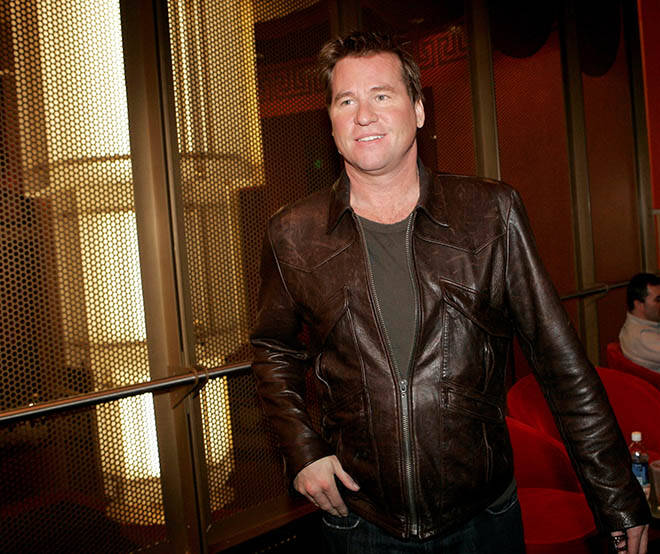A national park system is born in Chile
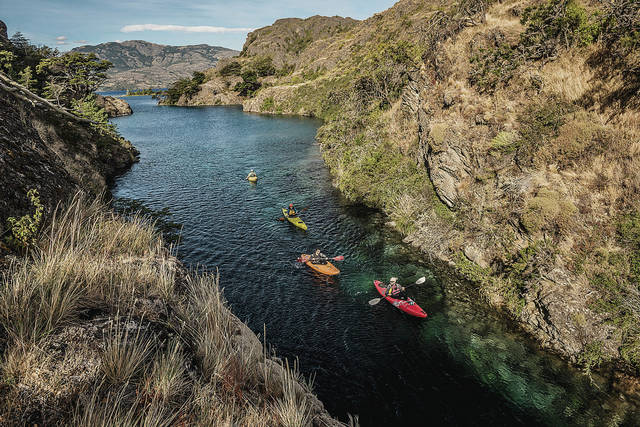
NEW YORK TIMES
River guides from Rutas Pachamama kayak tours take a group out into the Patagonia National Park in Chile. The park is the brainchild of Kristine McDivitt Tompkins and her late husband, Douglas, who founded The North Face and Esprit clothing companies, and starting in 1991, put $345 million — much of his fortune — buying large swaths of Patagonia.
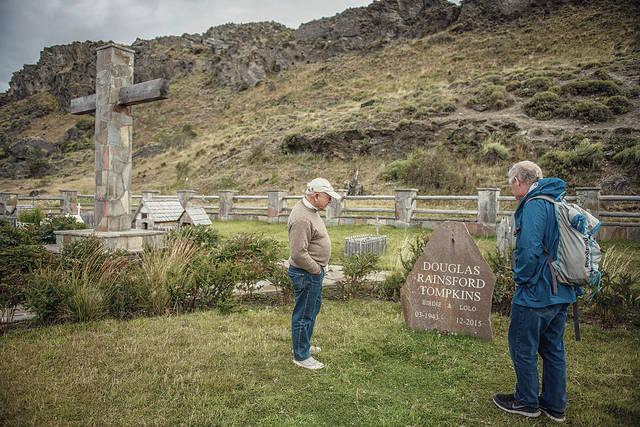
NEW YORK TIMES
Yvon Chouinard, left, founder of the outdoor-clothing company Patagonia, and the mountaineer Rick Ridgeway visit the grave of Douglas Tompkins near Patagonia National Park in Chile, the morning the Chilean president announced the new national park system.

NEW YORK TIMES
Hikers take in the view of Lake Cochrane and Mount San Lorenzo in the new Patagonia National Park in Chile.
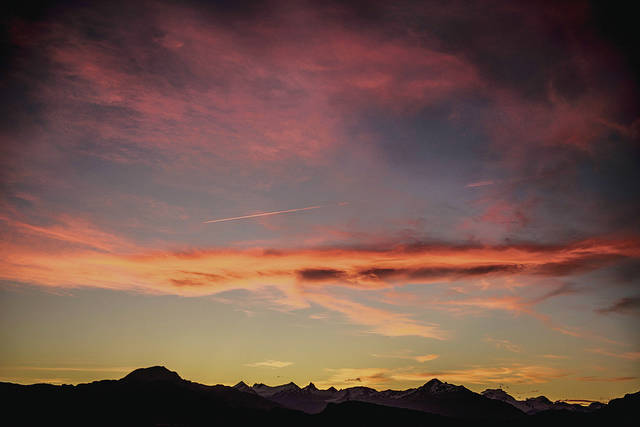
NEW YORK TIMES
Sunset over the Chacabuco Valley, in the heart of the new Patagonia National Park in Chile.

NEW YORK TIMES
Sunrise over snow-capped mountains that line the western edge of the Chacabuco Valley, in the heart of the new Patagonia National Park in Chile.
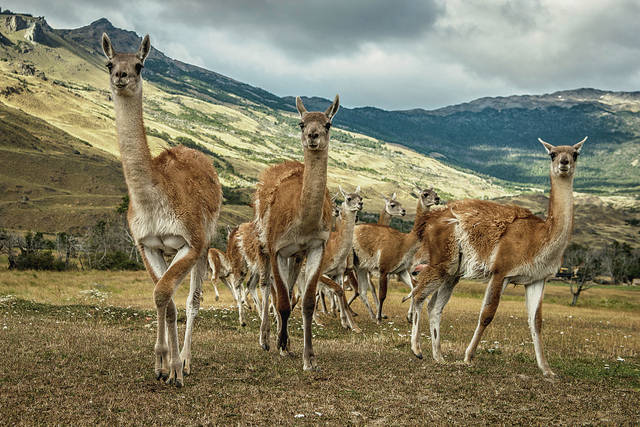
NEW YORK TIMES
Guanacos, a camelid native to South America, in the Chacabuco Valley, in the heart of the new Patagonia National Park in Chile.






COCHRANE, Chile >>
An eagle soared over the lone house atop an arid hill in the steppes of Patagonia Park.
In the valley below, not far from the town of Cochrane, then-President Michelle Bachelet announced the creation on Jan. 29 of a vast national park system in Chile stretching from Hornopiren, 715 miles south of the capital, Santiago, to Cape Horn, the southern tip of South America, where Chile splinters into fjords and canals.
The park is the brainchild of Kristine McDivitt Tompkins and her husband, Douglas Tompkins, who founded The North Face and Esprit clothing companies, and starting in 1991 put $345 million — much of his fortune — into buying large swaths of Patagonia.
As Bachelet spoke about the creation of the park network, Kristine Tompkins looked up and gasped, watching the eagle circling above the house, which she owns; aguila, or eagle, was the radio call name of her husband.
Douglas Tompkins died at 72 in December 2015, after a kayaking accident in Patagonia. Months before, Tompkins Conservation, an umbrella group of conservation initiatives the couple directed, proposed a deal to the Chilean government: It would donate more than 1 million acres of their preserved and restored territory to Chile if the government committed additional lands and designated new parks to create a Patagonian national park network.
Don't miss out on what's happening!
Stay in touch with breaking news, as it happens, conveniently in your email inbox. It's FREE!
The Bachelet administration ended up contributing 9 million acres, more than the couple had proposed, creating five new national parks and expanding an additional three. The deal was a rare victory for conservation efforts in a region where mining, logging and agriculture are increasingly threatening ecosystems and forests.
It was a partnership, Kristine Tompkins said in an interview, “a real model to do large-scale conservation and create national parks in a public-private way.”
The resulting 10 million-acre Patagonia National Park system is more than three times the size of the Yosemite and Yellowstone parks combined. It expands Chile’s national parklands by nearly 40 percent, enlarging the area of protection for pumas, condors, flamingos and endangered deer species.
By April 2019, the parks the Tompkinses donated will be run by Chile’s National Forestry Service; one will be renamed for Douglas Tompkins.
The parks are “good not only for Chile, but for the planet,” Bachelet said in an interview. “It shows that you don’t have to be a rich country to make these kinds of decisions. It only requires will and courage.”
Among some locals, though, reaction has been ambivalent.
Getting to the site where the ceremony took place that windy morning in late January required a seven-hour drive south from the closest airport, in Balmaceda, near the border with Argentina.
Along the way, unpaved roads wind through looming mountains, flanked by turquoise rivers and the seemingly endless General Carrera Lake.
Grasslands dotted with guanacos, a cousin of the camel, give way to sprawling steppes and forests, deep-blue waterways and majestic snow-capped mountains at the doorsteps of breathtaking ice fields.
Douglas Tompkins traveled through Patagonia in 1961, when he was 18, an adventure seeker and rock climber. He bought his first lands there 30 years later — the 42,000-acre Renihue farm in Los Lagos region, which he converted to organic agriculture.
The couple married in 1993, after McDivitt retired from the outdoor apparel company Patagonia, where she had risen to chief executive. They began “a very nomadic life looking at conservation projects in Chile and Argentina,” she said.
In partnership with philanthropist Peter Buckley, the Tompkinses purchased 208,000 more acres near the Corcovado volcano, south of Renihue. They also bought more land farther south, and large tracts in northeastern Argentina, which they are donating to the Argentine government.
Over the years, they continued buying property, largely from absent landowners, developing the more than 700,000-acre Pumalin Park, made mostly of temperate rainforests including the millenary alerce tree, a relative of the California redwood.
The valleys were used for ecological farming. Luxury cabins, camping sites, hiking trails and other infrastructure were built to open the park to the public.
Suddenly, the Tompkinses were at the center of national security concerns.
Politicians and the military argued that Pumalin Park, which crosses the narrow space between the Pacific Ocean and the Argentine border, cut the country in two, jeopardizing national sovereignty.
Business leaders and landowners accused Douglas Tompkins of impeding economic development. Nationalists said he was secretly creating a Zionist enclave in Patagonia.
Leftist parties were alarmed that an American businessman was buying big chunks of Chile. The Roman Catholic Church objected to the Foundation for Deep Ecology, which Tompkins founded in 1990 in San Francisco, saying it sought population control.
Tompkins was vilified in the conservative news media, interrogated by congressional commissions and threatened with deportation.
Then, in 2005, the Tompkinses began donating land to the Chilean government to create a park. That same year, the government designated Pumalin a nature sanctuary.
By then, Tompkins Conservation had bought another large parcel of land, a 764,000-acre sheep farm in Valle Chacabuco, which it named Patagonia Park. Local ranchers and farmers objected to the purchase, saying their traditional livelihoods were being disrupted.
With the help of international donors and partners, the group took down more than 400 miles of fencing, removed 25,000 sheep and again built high-end lodges, campgrounds, hiking trails and roads, developing programs to restore natural ecosystems and to reintroduce wildlife to their natural habitats.
“There is something about the expanse of Patagonia, a kind of haunting soulfulness to it that affects you physically,” Kristine Tompkins said the day the new park network was announced. “Few places like this one grab you and hold on to you like it happened to Doug and I.”
© 2018 The New York Times Company

